FOCUS ON
BAKU—MOSCOW RELATIONS
Aslan Ismailov on why Ilham Aliyev’s defiance marks a “point of no return” for Azerbaijan’s place in Russia’s “Russkiy Mir" PAGE 5


Aslan Ismailov on why Ilham Aliyev’s defiance marks a “point of no return” for Azerbaijan’s place in Russia’s “Russkiy Mir" PAGE 5

It’s easy to overlook a small country like Georgia on the global map, but ZEG—a festival I call an “Influencer Festival”—proves it can be a powerful voice in the world. ZEG isn’t just an event. It’s a living space for fresh ideas, open dialogue, and bold thinking. My journey with ZEG began years ago as a social media volunteer. Since then, I’ve become a close friend of the festival and witnessed it grow into a vibrant, award-winning “ambitious child,” now preparing to expand into Amsterdam and London. At the heart of ZEG is its group of visionary female founders. Each year they curate an agenda shaped around a central theme. This year’s edition—the largest yet—brought together over 50 speakers to tackle local, regional, and global issues. I joined for just one day this year, guided not by the schedule but by intuition. I drifted between sessions, unaware of who was speaking, and still, I was struck by what I heard. ZEG always surprises. In a time of political and emotional upheaval in Georgia, it felt like exactly the right place to be— where people don’t just speak alike, but think differently and challenge each other through open dialogue.

In this week’s issue...
Israel-Iran Latest: Tensions Escalate as Iran Suspends IAEA Cooperation Following US and Israeli Strikes
NEWS PAGE 2
Ukraine Latest: US Halts Aid as Russia Escalates Attacks, North Korea Deepens Involvement
POLITICS PAGE 3
How Georgia’s Hazelnut Sector Is Growing Toward a Sustainable, High-Quality Future
BUSINESS PAGE 6
Russia Back to the Soviet System of Education
SOCIETY PAGE 8
Voice Over Noise: Anita Rachvelishvili’s Velvet Thunder Echoes through the Factory Walls
CULTURE PAGE 9
AFA – Art Foundation Anagi Launches with a Private Viewing in Tbilisi
CULTURE PAGE 11



Donald Trump has attempted to broker several peace agreements, with limited success. Source: Getty, SBS COMPILED BY TEAM GT
Tensions remain high over Iran’s nuclear program and its future engagement with international oversight. On July 2, Iranian President Masoud Pezeshkian signed a law suspending cooperation with the International Atomic Energy Agency (IAEA),
citing a loss of trust in the agency after Israeli and US attacks on Iranian nuclear facilities. “The IAEA no longer has credibility with Iran,” Pezeshkian told French President Emmanuel Macron in a call, emphasizing that Iran would no longer allow unapproved inspections at its nuclear sites.
This move follows a sharp escalation in hostilities in June, where the US and Israel carried out strikes on Iran’s nuclear facilities, significantly damaging its
BY TEAM GT
ritish Member of Parliament
BJames MacCleary has renewed his call for immediate UK sanctions against Bidzina Ivanishvili and what he described as his “corrupt government,” referencing a letter from jailed Georgian opposition leader Zurab Japaridze. “It’s deeply humbling to be mentioned by Zurab Japaridze in his powerful letter from prison,” MacCleary wrote on X (formerly Twitter). “Ivanishvili and his corrupt government must face immediate UK sanctions. Zurab and every Georgian political prisoner deserve freedom
and justice – now.” MacCleary’s statement follows the release of an open letter by Zurab Japaridze, leader of the opposition party Girchi — More Freedom, who was sentenced to imprisonment for his role in recent anti-government protests. In his letter, Japaridze referenced MacCleary’s support and called on the international community to stand up for democratic values in Georgia.
The British MP has been among the most vocal international figures condemning the Georgian government’s crackdown on opposition leaders and civil society. His latest remarks add to mounting international pressure on Georgian authorities amid growing concerns about democratic backsliding.
BY MARIAM RAZMADZE
Parliament has started discussions on a legislative proposal that would give the Georgian government exclusive authority over importing psychotropic drugs and managing opioid substitution therapy (OST) programs.
The explanatory note mentions that the law aims to unify control, tighten oversight, and reduce systemic risks.
Under proposed amendments to the Law on Narcotic Drugs, Psychotropic Substances, Precursors, and Narcotic Assistance, only state-established institutions would be permitted to import and sell these substances. They would also become solely responsible for administering OST programs, currently provided by both state and private entities.
Currently, OST is delivered by the state-run ‘Center for Mental Health and Drug Prevention’ and eight private clin-

Pills. Source: Mansfield UMADAOP
ics. The reform would kick out private sector involvement. At the moment, 11,401 patients use services at the state facility, while the number receiving treatment through private providers will be confirmed during implementation.
The most important part of the reform is financial relief for patients. Many currently pay about 1,000 GEL per month for substitution therapy. If the law passes, the government will fully fund these services.
If adopted, the proposed law will go into effect on March 1, 2026.
Abbas Araghchi dismissed the prospect of immediate discussions. “The end of US military threats is a precondition for the resumption of talks between Tehran and Washington,” Araghchi stated in an interview, underlining Iran's stance that diplomatic engagement is contingent upon the cessation of US military actions.
In the US, government officials have also expressed concern over Iran's nuclear developments. US State Department spokesperson Tammy Bruce said that Iran's suspension of cooperation with the IAEA was "unacceptable," stressing the need for Tehran to fully cooperate with international safeguards. “Iran cannot and will not have a nuclear weapon,” she asserted. The US position reflects ongoing concerns about Iran’s nuclear ambitions and its defiance of international monitoring mechanisms.
cally and economically, asserting that Tehran’s nuclear ambitions remain a direct threat to regional stability. Despite the mounting international pressure, Iran has remained defiant. An Iranian diplomatic source told Euronews, “How do you think we can guarantee the safety of IAEA inspectors when our peaceful facilities were targeted just days ago?” This sentiment reflects the broader skepticism in Tehran regarding the motives of the IAEA and other international bodies, particularly following what it perceives as hostile actions from the US and Israel.
capacity to enrich uranium. Despite these setbacks, IAEA head Rafael Grossi warned that Iran could resume uranium enrichment within months. Grossi's comments were a reminder that the situation remains fluid, with Iran potentially regaining nuclear capability at a rapid pace. The US had initially hoped to resume talks with Iran on its nuclear program, with President Donald Trump suggesting that negotiations could restart soon. However, Iranian Foreign Minister
In the European camp, Germany’s Foreign Ministry called Iran’s decision a “disastrous signal.” German spokesperson Martin Giese emphasized the importance of continued collaboration between Iran and the IAEA for any potential diplomatic resolution. “For a diplomatic solution, it is essential for Iran to work with the IAEA,” Giese said, echoing widespread international calls for transparency in Iran’s nuclear activities.
At the same time, Israel’s Foreign Minister Gideon Saar urged European nations to trigger the “snapback” mechanism of the 2015 nuclear deal, which would reinstate all United Nations sanctions on Iran. Saar’s comments are part of Israel’s broader push to isolate Iran diplomati-
The situation in Iran has also been complicated by domestic concerns. While President Pezeshkian ordered the suspension of IAEA cooperation, the government has faced internal criticism for its handling of the war and the subsequent economic toll. Tehran reported over 900 civilian deaths as a result of the conflict, a tragedy that has fueled further resentment toward Israel and the US.
In light of these developments, the broader prospects for a renewed diplomatic deal between the US and Iran remain unclear. With the Trump administration unlikely to reverse its stance, and Iran firmly asserting its right to pursue nuclear technology, the likelihood of a lasting agreement appears slim. The ongoing political and military posturing signals that the confrontation between Iran and the West, particularly the US and Israel, is far from over, and the potential for further escalation remains a real threat.

BY TEAM GT
Giorgi Gakharia, leader of the opposition For Georgia party, has condemned the revocation of his party’s parliamentary mandates as a politically motivated act aimed at silencing opposition ahead of municipal elections. In a statement on social media, Gakharia claimed the move was intended to "pave the way for politically motivated prosecutions" and remove a major political threat.
“Stripping our mandates was never about procedure,” he wrote. “It was about paving the way for politically motivated prosecutions and removing a major political threat before the municipal elections.”
The mandates of 12 For Georgia MPs were revoked after they were absent
from numerous parliamentary sessions. Among those affected were Gakharia and several prominent members of his party. With the revocation, Georgia’s 11th parliament is now reduced to 89 members, down from the required 150. This move leaves the parliament in a state of dysfunction, with 61 total mandates revoked so far.
Gakharia, in response, emphasized that the parliamentary boycott was a legitimate response to the “fraudulent” 2024 elections, adding that it was a constitutional right. "We’ve seen this before— remove immunity, invent criminal charges, and eliminate political alternatives. It’s a page straight out of the Kremlin’s playbook," he said.
The revocation of the mandates also results in the suspension of state funding for For Georgia, as more than half of its elected MPs missed more than half of the plenary sessions.
Gakharia further accused the ruling Georgian Dream party of running a “oneparty regime,” claiming their actions are aimed at consolidating power and diminishing opposition voices. "When you voted to terminate our mandates, it was your political decision," he asserted during a session of the temporary investigative commission. "If you expect us to take responsibility for your legitimacy, you're very wrong."
He also raised concerns over the commission's shift in focus, stating that its original purpose had been abandoned. “You declared one goal for this commission, but now you're investigating completely different matters," Gakharia added.
Despite these setbacks, Gakharia concluded that For Georgia's actions would be judged by voters in the upcoming elections, highlighting that the political battle was far from over.

COMPILED
BY
ANA DUMBADZE
As Ukraine faces recordbreaking Russian drone and missile assaults—over 5,300 Shahed drones launched in June alone—the US has paused deliveries of crucial military aid, including over two dozen Patriot and Stinger systems, Hellfire missiles, and precision-guided munitions, with the Pentagon citing concerns over dwindling stockpiles. President Trump has not approved new aid packages since taking office, and upcoming defense budgets signal a reduction in Ukraine support.
While Ukrainian and US officials con-
tinue “working-level” talks, Kyiv has requested urgent consultations, warning that any delay emboldens Russian aggression. NATO Secretary General Mark Rutte stressed that Ukraine “cannot do without full support,” while the Kremlin welcomed the decision as a sign the war’s end is nearing.
Ukrainian intelligence claims that North Korea is preparing to deploy up to 30,000 soldiers to Russian-occupied Ukrainian territories—nearly tripling its initial 2024 troop contribution. Satellite images and intercepted logistics hint at active troop transfers via Russian territory. Pyongyang is also reportedly sending engineers, sappers, and large quantities of artillery and missiles. These moves follow the 2024 Russia-North Korea defense treaty
pledging mutual assistance in case of attack.
Ukrainian forces have rejected Russian claims of a breakthrough into central Ukraine, stating that a small reconnaissance group briefly entered the village of Dachne to take staged photos with a flag before being neutralized. Two Russian soldiers were captured during a follow-up assault and were added to Ukraine’s prisoner exchange pool. Ukrainian officials insist that Dachne remains fully under their control.
Ukraine struck deep into Russian territory with a drone attack on the Kupol military plant in Udmurt Republic, over 1,300 km from the front. The facility, key to Russia’s production of air defense systems and drones, suffered major damage, halting operations in four workshops. Three people were killed and dozens injured. Kyiv described the strike as part of its strategy to weaken Russia’s defense industry from within.
Ukrainian prosecutors have documented 273 summary executions of POWs by Russian forces—half of them in 2025 alone. Despite opening 77 criminal cases, only two convictions have been issued. Ukraine’s military intelligence and the UN have repeatedly warned that Russian soldiers may be under orders to kill surrendered troops. Investigations continue into the 2022 Olenivka prison massacre, which Kyiv and internal UN findings blame on Russia.
As Russia escalates its military campaign and deepens partnerships with authoritarian regimes, Ukraine is bracing for a long, uncertain summer—without key Western aid and under unrelenting assault.

BY MARIAM RAZMADZE
Tbilisi Mayor Kakha Kaladze announced that around 400 families officially registered as homeless will receive housing by October 2025, as part of a bigger presentation on healthcare, social, and housing initiatives by Tbilisi City Hall between 2018 and 2025. Kaladze stated that all municipal projects aim to make residents ‘feel comfortable in the city.’
He highlighted some of the main programs, including homeless registration, legalization of informal housing and support for families affected by halted cooperative housing developments.
“The housing legalization program has been especially impactful,” said Kaladze. “For years, families lived in homes they couldn’t legally claim. In 2017, we began transferring ownership of these state-owned properties to residents, assets worth hundreds of millions.” Kaladze also addressed the issue of cooperative housing construction. “This was a problem no previous government managed to resolve. Our team took real steps to support these residents,” he stated.
When it comes to education reforms, the mayor mentioned alleged progress in the city’s kindergarten system. “Thanks to our efforts, kindergartens are now free. Previously, fees placed a major burden on families,” he claimed.

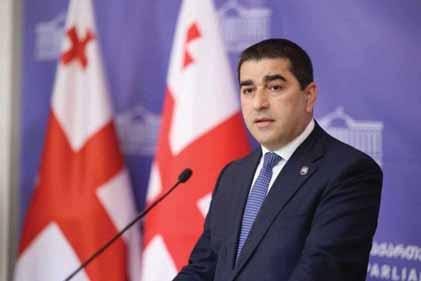
BY TEAM GT
Parliament Speaker Shalva Papuashvili has called for an end to what he described as “anti-Georgian rhetoric,” accusing foreign diplomats of misrepresenting the government’s statements and intentions.
“We speak Georgian, they speak English, and somehow we can’t understand each other,” Papuashvili said. “The British ambassador is even learning Georgian, supposedly to better understand
us, but we say one thing, and they respond with something completely different.”
His comments come amid ongoing tensions between the Georgian government and Western partners, particularly over concerns related to democratic backsliding and the controversial “foreign agents” law, which has drawn sharp criticism from the EU, UK, and the United States.
Papuashvili’s remarks reflect growing frustration within the ruling Georgian Dream party over what it perceives as unfair and politically motivated external pressure.
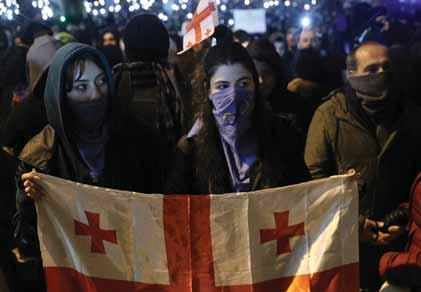
BY MARIAM RAZMADZE
The ruling party Georgian Dream has introduced a bill that would impose stricter penalties for repeat violations related to protests, moving to fast-track the proposal through Parliament. The amendments target individuals who repeatedly engage in acts such as blocking roads, insulting officials or disobeying police orders.
Under the draft legislation, if an offender fails to pay a fine for a protest-related
BY TEAM GT
The Israeli Embassy in Georgia has sharply criticized Deputy Foreign Minister Aleksandre Khvtisiashvili for attending a solidarity event at the Iranian Embassy in Tbilisi, calling the act “morally wrong.”
“We were dismayed to learn that Georgia’s Deputy Foreign Minister attended a solidarity event at the Iranian embassy in Tbilisi. At a time when the West condemns Iran’s attacks on Israeli civilians and supports efforts to stop its nuclear and genocidal ambitions, it is deeply disappointing to see the Deputy Foreign Minister taking part in such an event. This is morally wrong,” the Embassy said in a statement provided to InterpressNews.
Earlier today, the Iranian Embassy released a statement reporting that Deputy FM Khvtisiashvili signed a book of condolences at the embassy, express-

ing sympathy for those killed in what Iran described as an Israeli attack, and showing solidarity with Iran.
The Iranian Embassy says the event was attended by representatives of several countries, including the ambassadors of Turkmenistan, Kazakhstan, Armenia, and Azerbaijan, the Chargé d’Affaires of
Iraq, and the Chinese Military Attaché. Religious leaders and members of the Iranian and Georgian-Iranian communities were also present.
“We express our deep gratitude to our friends and partners for their support and compassion during this difficult time,” the Iranian Embassy stated.
OP-ED: Good Things Are Happening in Our Neighborhood. On Azerbaijan–Russia–Armenia
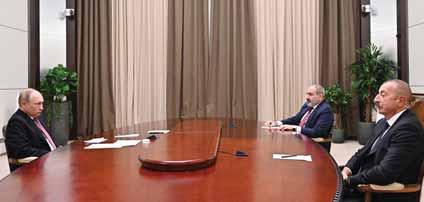
BEKA
Despite my enduring antipathy towards Ilham Aliyev, the main architect behind Azerbaijan’s swamp of dictatorship and corruption, I’ve admired him just as much as a grandmaster of foreign policy. Aliyev outplayed not just Armenia’s foreign policy but Russia’s too, and it’s worth pausing on the latter to appreciate just how deftly he has pinned Putin to the mat (pun very much intended).
Historically, Azerbaijan’s collective memory is anti-Russian, while Armenia’s is the opposite. For nearly two decades, Aliyev built up the perfect image for Putin: a model post-Soviet strongman; a dictator who opens the gates wide for Russian language and culture at home.
Joint press conferences would laud the “Russian House” operating smoothly in Azerbaijan, Russian schools flourishing by the hundreds, thousands of pupils enrolled, Baku hosting a branch of Lomonosov Moscow State University, and so on.
Meanwhile, the Armenians staged a democratic revolution, re-examined their foreign policy, dreamed of democracy, and began to curb the Russian language’s reach.
simple reason: the only alternative was Armenia’s old, pro-Russian, corruptionridden elite that had ruled for two decades prior.
Armenia’s 2018 revolution was never really about foreign policy. Armenians didn’t crave a geopolitical shift — they simply wanted an end to the swamp of corruption and stagnation. Had Russia chosen pragmatism, backing that popular yearning for change, it could have kept both Karabakh and Armenia under its thumb. But Putin has never been able to approach revolution and democracy pragmatically. Instead, he backed Armenia’s most marginalized factions and “greenlighted” Aliyev on Karabakh, only to see Armenia’s politics tilt sharply anti-Russian.
Moscow never wanted Karabakh’s conflict resolved. But by 2023, bogged down in Ukraine, Russia no longer had the muscle to restrain Aliyev militarily. So Aliyev settled the conflict on his own terms.
Once that conflict ends, the need for Russian leverage in both Armenia and Azerbaijan drops to zero. Pashinyan understood this, and chose his path: diplomacy to neutralize threats from Turkey and Azerbaijan, even at the cost of personal humiliation if needed. If he pulls that off, Armenia no longer needs Moscow as its security guarantor. It can pivot to Europe. Thankless, painful personally for him, but a pragmatic move. And for that, Pashinyan deserves real respect.
flags, compensation, a public word of sympathy, if not an outright apology. But Russia doesn’t treat its “natives” with such courtesy.
This was the moment Azerbaijan’s dormant anti-Russian DNA kicked back in — the same DNA Aliyev had kept tranquilized for two decades in the name of realpolitik. Now, with Moscow’s Karabakh leverage gone, Russians stuck in Ukraine and unapologetic over a downed plane, Aliyev made his move to show that he, too, is “one of the big boys,” especially after the Second Karabakh War. He shut down the “Russian House” — the cultural center of Moscow’s soft power, but did so under an anti-Western slogan to spare Moscow the humiliation and avoid provoking an immediate backlash. To keep up appearances, he also closed USAID offices — but the real story was the closure of Russian cultural hubs.
Putin reacted with his usual boorishness, unable to accept Aliyev’s sovereign move or Azerbaijan slipping out of the “Russian World.” Moscow’s response? FSB tactics: raid Azerbaijani diaspora leaders across Russian cities, humiliate them, film them, drag them into police vans. Two of them died. The plane downing wasn’t enough — now they came for ethnic Azeris inside Russia too.
Aliyev counterpunched: he detained the head of Sputnik Azerbaijan, roughed up a few Russian citizens, filmed it, broadcast it. The Kremlin doubled down, arresting more Azerbaijanis on camera. Aliyev hit back harder — announcing the closure of Russian schools, which means only one thing: a formal exit from the “Russian World” and a torch to the last vestiges of Russian cultural presence in Azerbaijan. Russian propaganda channels are now frothing at the mouth — threatening war, economic shutdowns, open insults on prime-time TV. Russia’s imperial arrogance and idiocy have only sped this up, but the outcome was inevitable anyway. Azerbaijan’s memory has never asked for Russia: it is wired against it.
offense and repeats the violation, they will face administrative imprisonment.
The proposed changes apply but are not limited to the following scenarios:
• Disobeying lawful police orders
• Insulting public or political officials
• Violating the rules governing public assemblies and demonstrations
The amendments also revise the appeals process. In cases where imprisonment is imposed, appeals will bypass higher administrative bodies and go directly to court. Once the court issues a decision, it will take immediate legal effect.
If passed, the legislation will be a significant shift in the government’s approach to managing civic society.
In 2020, Putin succumbed to the temptation to punish his historical ally, Armenia — or more precisely, its leader Pashinyan — with Aliyev’s hands. But he didn’t let Aliyev finish the job: he let Azerbaijan recapture the key city of Shusha, then called time on the war, so that the conflict would remain unresolved and Moscow could keep its grip as the region’s “mediator.” So long as Russia played mediator, Armenians and Azerbaijanis competed for its favor — the perfect balance for Moscow. But Putin upset this balance in 2020, hoping to alienate Armenia enough that its people would topple Pashinyan. That coup never came. Pashinyan proved resilient for a
Yet normalization requires both sides. There was always a risk Aliyev might not want reconciliation — the Zangezur Corridor, fresh attempts to exploit Armenia’s weakness, the temptation to keep the old enemy narrative alive, as dictators always do. For now, Aliyev has dodged signing a peace deal, under a thousand pretexts.
Then Moscow stepped in, accidentally or not. A Russian missile brought down an Azerbaijani passenger plane. People died. There was no real Russian reaction — Putin mumbled an apology to Aliyev in private. But in politics, private whispers mean nothing. Dozens died — there should have been mourning, lowered
There is still a chance this spiral of escalation won’t harden into a lasting strategic standoff. But if it does, Aliyev cannot fight Russia and Armenia at the same time. Which means that Baku’s fight with Russia also brings a real chance for a peace deal with Armenia — and a vision of a more stable, friendlier Caucasus.
And if we do reach the point where both Armenia and Azerbaijan stand firmly anti-Russian, Georgia will struggle to stay pro-Russian in this neighborhood. At the very least, Tbilisi will have to soften its stance — if only to keep the balance of power with its neighbors. So, to put it simply: good things are happening in our neighborhood.
INTERVIEW BY VAZHA TAVBERIDZE
He is one of Azerbaijan’s best-known lawyers and an outspoken human rights defender — and for decades, Aslan Ismailov has been watching Moscow’s games in the South Caucasus up close. In this wide-ranging conversation with Radio Free Europe’s Georgian Service, Ismailov argues that the sudden rift between Baku and the Kremlin was anything but sudden — instead, he says, it was the inevitable result of Moscow’s imperial reflexes colliding with a new generation of leadership in Baku. He explains why Ilham Aliyev’s defiance marks a “point of no return” for Azerbaijan’s place in Russia’s “Russkiy Mir,” why Putin’s last trump card — the Azerbaijani diaspora — is unlikely to save him this time, and why Turkey and the West stand to benefit from a tectonic geopolitical shift that could reshape the entire post-Soviet neighborhood, Georgia included.
LET’S LOOK AT THIS CHRONOLOGICALLY — WHAT STARTED IT ALL, THIS SPAT BETWEEN RUSSIA AND AZERBAIJAN?
Russian TV portrays it all as if it came out of nowhere — “look at this friendship we had, now it’s ruined” — but this was no accident. It’s been going on since the day the USSR collapsed. Back in 1993, Russia had other plans: to bring its own man to power, Mutalibov. But former president Elchibey probably did the wisest thing: he made sure Heydar Aliyev came to power, because he knew Aliyev’s capabilities, his experience. He was a true statesman.
Later there were dozens of coup attempts that came to light, but it was never publicly said that they were Russia’s doing, because the country, and Aliyev, knew Russia’s power and kept silent.
Then Putin declared the collapse of the USSR a geopolitical tragedy. Already back then it was clear: Putin’s — Putin’s Russia’s — goal was to recreate the USSR. In 2008, there was Georgia, then Crimea. Part of this strategy was to always keep Azerbaijan under Moscow’s thumb. Now Russian TV pushes this idea that Putin “helped Ilham Aliyev liberate Karabakh.” Complete nonsense. Putin di indeed stay silent, didn’t interfere — but not because he loves Azerbaijan. He was counting on the fact that when Azerbaijan liberated its land — and he knew full well Azerbaijan would manage to do so if he didn’t intervene on behalf of the Armenians — then the Armenian people would once again follow Moscow’s tune and overthrow Pashinyan. That was the idea — not to help Azerbaijan. But it didn’t work out. Pashinyan turned out to be much smarter than his predecessors. This is where Putin miscalculated. He didn’t get what he wanted.
AND THEN HE MISCALCULATES AGAIN — GOES INTO UKRAINE THINKING HE’LL TAKE IT IN THREE DAYS.
Exactly. And why did he start with Ukraine? Because he knew perfectly well that if he could capture Ukraine in three days, that was it — Central Asia and the South Caucasus would be in his pocket too. On the second day of the war, I wrote that, as of today, the Ukrainian people are fighting not only for their freedom, but for the freedom of the entire postSoviet space. That’s undeniable. After these events, Ilham Aliyev took a clear stance. He recognized Ukraine’s territorial integrity. He started providing material and moral support to the Ukrainian people, and did not take Russia’s side. Last year, when things were already simmering, people who were watching closely could see that Russia would make some kind of move. They shot down a
passenger plane last year. That was done demonstratively. When the plane was shot down, the President made it clear: his message was that the Russian government should apologize and compensate the victims.
Nothing followed — because the “master” doesn’t talk with his servants like that. That’s how Putin sees himself. But here again, he miscalculated. He didn’t factor in Ilham Aliyev’s character. Aliyev didn’t stop there. He started demanding. Then came the May holidays, the parade — Putin invited him personally. Aliyev refused.
They sent the Federation Council to Baku, Matviyenko. Then they sent Gundyaev, Kirill, an FSB guy moonlighting as Patriarch of Russian Orthodox Church. He still stood his ground and didn’t go. So Russia went all in. Its only real card left is the Azerbaijani diaspora. Azerbaijanis fully provide for themselves, they don’t need anything.
AND HOW SERIOUS A LEVER IS THE AZERBAIJANI DIASPORA IN PUTIN’S HANDS? HOW MUCH DOES IT REALLY AFFECT ALIYEV’S DECISION-MAKING?
It’s their main and only real card. A very serious one. Because there are over a million of our compatriots living there. The vast majority of them are Russian citizens, not citizens of Azerbaijan — people who have been living there 20–30, 40–50 years. All the way to the Yekaterinburg raid, there have been dozens of such incidents. There’s been this animallike treatment, savage beatings of Azerbaijanis, in previous raids, but in Yekaterinburg, it ended in death — and for the president to stay silent about that would have been disrespectful to the country. And he knew the mood of the people. So he took a firm stand.
AND IF RUSSIA SENDS A SIGNAL: “WE’LL STOP IF YOU BECOME MORE COMPLIANT.” IS THAT AN OFFER BAKU WOULD EVER CONSIDER?
He will not become more compliant. That’s not in his character. He is Heydar Aliyev’s son. He can stay silent, but being compliant is out of the question. The response will be mirror-like. The only thing I regret, and I wrote about this, is that here they arrested a Sputnik staffmember, other people from agent networks. They needed to be arrested, but not the way Russia does it. I voiced my outrage about that.
YOU ARE ALLUDING TO THE OBVIOUS FACT THAT THEY WERE BEATEN?
Yes. That’s the trademark of Russian police. We should be better than that. But the agent network purge will definitely continue.
WHAT WILL THE CONSEQUENCES BE FROM THE RUSSIAN SIDE?
Our border has already been closed for over five years. It’s clear Aliyev knew that Putin could do this at any moment. Flying a million people by plane into Azerbaijan to destabilize public order — that’s absurd. Of course, there are many people in Azerbaijan who are unhappy with the authorities and their illegal actions, I admit that. But on this issue, the people stand united with the government.
The only thing is that there are a lot of influential Azerbaijanis in Russia. There are billionaires, there are powerful diaspora leaders. Now they’ll be squeezed in every possible way to use their leverage on Azerbaijan. It’ll be something like what they pulled off in Georgia. They already have an Azerbaijani “Bidzina Ivanishvili” here. Everyone knows who he is: oligarch and billionaire Ilham Rahimov, Putin’s closest friend. Now they want to turn him into a hero — supposedly he “freed” the head of the diaspora in Yekaterinburg. Then they forced
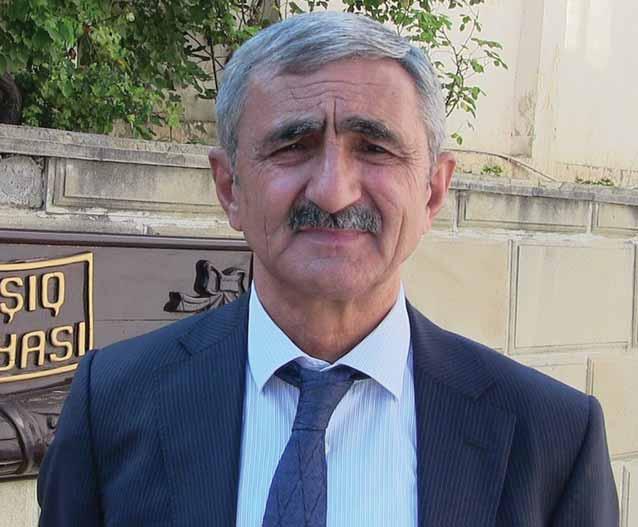
that diaspora leader to thank Rahimov. The Kremlin jailed him, then freed him itself. All of it was done to boost Rahimov’s profile. No doubt about that. Many people are now spreading this story, suggesting that he’s some savior of the nation and so on. I know him very well. For him, his homeland is not Azerbaijan. His homeland is Russia. That was Putin’s last trump card that he kept up his sleeve for years. But that won’t work either. The only thing I’ll say again — it will be hard for our people living in Russia.
IS WHAT WE ARE WITNESSING RIGHT NOW JUST A TEMPORARY WORSENING OF RELATIONS, OR HAS IT CROSSED THE POINT OF NO RETURN — HAS AZERBAIJAN WAVED GOODBYE TO THE ‘RUSSKI MIRRUSSIAN WORLD’ FOR GOOD?
This is already the point of no return. Going forward, naturally Azerbaijan and the Azerbaijani people — I say this sincerely — the Azerbaijani people do not want to be enemies of Russia or the Russian people. We want to be a good neighbor, but without anyone’s dictate: on equal terms.
DO YOU THINK RUSSIA IS READY FOR THAT? DOES IT EVEN KNOW WHAT IT MEANS TO DEAL ON EQUAL TERMS?
The Russian government doesn’t know how, no. Putin and Putin’s Russia recognize nothing but force. Right now, the Kremlin is trying to spin what’s happening in Yekaterinburg as if it’s just the work of law enforcement, as if the Kremlin has nothing to do with it — it’s an outright lie.
IT SEEMS RUSSIA HAS NOW LOST ITS ROLE AS A MEDIATOR BETWEEN ARMENIA AND AZERBAIJAN FOR GOOD. WHAT NEW SCENARIOS DOES THAT OPEN UP FOR REGIONAL GEOPOLITICS?
That’s the key question, isn’t it? After 2020, Armenia, under Pashinyan, decided that being hostile with neighbors brings nothing good, and that they should move toward a peace deal. And we agreed to that too. I state unequivocally that the reason that to this day no peace treaty has been signed between Armenia and Azerbaijan is directly because of Russia’s interference. Just recently, Lavrov said
that any agreement without Russia would worsen the situation in Armenia. In parallel, we have seen a coup attempt in Armenia — oligarch Samvel Karapetyan was brought in specifically for that coup. Etchmiadzin — that’s another Kremlin agent network, also on Russia’s side. The Kocharyan and Sargsyan forces want a coup there too, but I think if the people of Armenia back the leader they themselves elected, it won’t succeed. So this whole “geopolitical spasm series” of Putin’s is because Azerbaijan and Armenia are about to sign a deal with each other without Russia, leaving Moscow’s control for good.
Azerbaijan and Armenia leaving means Georgia leaves automatically too. And that means the loss of the South Caucasus. And losing the South Caucasus down the line means losing Central Asia too. Putin understands that. So even though he has other problems, he’s pushing on this. The old man has lost his mind. He is terrified that this might end up being his legacy, instead of him being remembered as the great modern day Tsar.
AND WHAT IF GEORGIA DOESN’T WANT TO SLIP AWAY FROM RUSSIA?
In Georgia, there’s the Georgian people and the Georgian government, and these are very different things; things very much at odds with each other. If the Georgian people truly, clearly and unconditionally want the West, then the government under Bidzina Ivanishvili can’t stay in Russia’s orbit. That’s a fact. If the people support the country’s leader, not even the whole world can overthrow him. If the people want to get rid of the leader, not even the whole world can save him. The decision lies with the people of Georgia.
WILL TURKEY’S ROLE GROW EXPONENTIALLY AS A RESULT OF THIS GROWING RIFT BETWEEN BAKU AND MOSCOW?
I think the main thing here is for Armenia and Azerbaijan to sign a peace deal. Both leaders need to do this immediately to save their countries. Turkey is the only decisive player in all of this. That’s why Pashinyan went there — and both Pashinyan and Azerbaijan know very well that Turkey is a NATO member and has the strongest army in the region, and that Turkey won’t act like Russia here
If Putin keeps stoking this, if he pushes for further escalation, it will lead to the breakup of Russia
— won’t have this trademark Russian attitude, act like a master and a serf. Turkey wants cooperation on equal terms.
LET ME PRETEND I’M A PRO-KREMLIN JOURNALIST AND ASK: MIGHT TURKEY STOP PLAYING FAIR ONCE RUSSIA IS GONE?
No, that’s impossible. Because Turkey is a NATO member. NATO members will never allow Turkey to act here the way Russia does. Everything in this world is interconnected. And Turkey is not a nuclear state — the West has more leverage over Turkey than over Russia. AND IF RUSSIA REFUSES TO LEAVE?
Azerbaijan is not a weak country in military terms. Azerbaijan showed its strength in Karabakh. And I know for a fact that, since then, Azerbaijan has been actively ramping up its military potential. In addition, there is the Shusha Declaration between Turkey and Azerbaijan. There is also a strategic cooperation alliance between Azerbaijan and Pakistan. Pakistan, by the way, is a nuclear power. So Russia won’t swallow Azerbaijan that easily. Many of Putin’s Russian lapdogs are saying they should declare war, send in troops, and so on — but that would lead to Russia’s final collapse. Because any troop movement through the North Caucasus will blow up the North Caucasus. There’s Dagestan, Chechnya, Kabardino-Balkaria, KarachayCherkessia. If that spark ignites, then later Tatarstan, Bashkortostan, Yakutia… If Putin keeps stoking this, if he pushes for further escalation, it will lead to the break-up of Russia.
ZEG Festival is nothing short of an Oscar-level experience. The sessions activate you, not just inspire. The stories are deeply human, leaving you torn between wanting to attend everything and needing to be present in just one moment. ZEG teaches you to choose wisely and listen deeply.
In her closing remarks, host Ninutsa Nanitashvili captured this spirit perfectly:
“We cried not just from sadness, but because we found something rare: connection. We found humanity again… ZEG is happening. That means something. Because the face of humanity is still here—in people who show up.”
I cried too, especially during the final session with Dr. Seema Jilani, a humanitarian pediatrician and writer. She shared stories of helping refugees, rooted in her own family's migration. But it wasn’t just her past that moved us—it was how she transformed grief into purpose, culminating in a surreal tribute to her father’s dream: singing and dancing like Elvis. It wasn’t performance—it was rebirth.
Another unforgettable moment came from Georgian pianist Giorgi Gigashvili, in conversation with storyteller Joe Sabia. Giorgi, an acclaimed artist and activist, refuses to separate his art from politics. His words weren’t a performance—they were a Manifesto of Resistance:
“Sometimes my art feels powerless. I’ve wanted to break a piano. But now, when I’m in the street, my voice becomes
the piano. I am political on stage—it’s my voice.”
His reflections were deeply personal: “I don’t have much charisma, but I have inspiration on stage. I play for someone who is ready to fight for something better; for someone who follows me. Wherever I am, I play as if I’m in my country.”
He invoked the unjust imprisonment of Mate Devidze, urging artists not to stay neutral. He called on silent Russians to speak out. To Giorgi, music is resistance. Playing a sonata is like preparing for protest—your whole body rises with the emotion.
That’s what ZEG is really about: finding courage when you don’t know what to do. Finding your voice—on stage, in art, or simply by showing up.
ZEG: A SPACE TO STEP OUTSIDE THE BUBBLE
ZEG is more than a festival. It’s a rare reunion. In an era where even storytellers can get stuck in their own narratives, ZEG invites you to step outside. You hear different perspectives—generational, regional, and ideological.
Sessions tackled war in Ukraine, the Middle East, and Latin America—not just as news items, but as human experiences shaped by who’s telling the story. ZEG challenges us to reflect: storytelling is never neutral. Real understanding starts with making space for others.
One quiet session stood out: “Storytelling 201: Story Clinic Office Hours” with Michelle Darby. Participants came with
raw, unfinished stories, and left with voice and clarity. One result was the powerful speech by Palestinian-American speaker S. Jilani, shaped in that very clinic. Artist Nikusha Bakradze, in his session ‘Why Talking Still Matters,’ put it simply: “Talking is easy. Listening is harder. But through nonjudgmental dialogue, we can truly understand and even prevent conflict.”
In a world full of noise, ZEG reminded us: listening is an act of resistance.
In ‘The Art of Resistance: MOCAO’s Journey,’ young Colombian activists who survived police violence turned trauma into rap, dance, and storytelling. At one point, the audience covered one eye—a symbolic gesture of solidarity. It was my first time seeing Colombian art so boldly confront power.
In ‘Mzia’s Story: Journalism on Trial,’ we heard about Mzia Amaglobeli’s arrest and hunger strike—symbolic of Georgia’s broader fight for press freedom. The panel, led by human rights lawyer Caoilfhionn Gallagher KC and journalist Irma Dimitradze, showed how dangerous truth-telling can be under authoritarian regimes.
In ‘Lessons of Resistance,’ speakers like Giorgi Kandelaki and Maksym Eristavi emphasized that resistance isn’t just protest—it’s building a future. And sometimes, resistance begins quietly: through small acts, self-awareness, and endurance when no one’s watching.
Gender played a vital role at ZEG. Journalist Masho Lomashvili recalled being
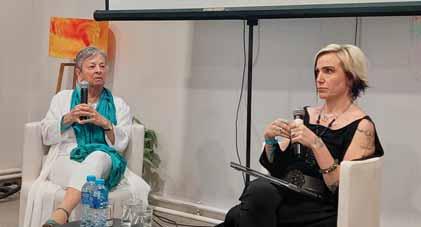
a child during the 2008 war, watching helicopters fly overhead while women around her bore the emotional weight of fear. She reminded us that resistance often begins in memory.
One of the most emotionally charged panels, ‘Waging Peace: When Waiting Isn’t an Option,’ brought together Jo Even Caspi, founder of Waging Peace, and Palestinian peace activist Nivine Sandouka. Despite being from opposite sides of conflict, both women shared their vulnerability and strength, calling for action, not just hope.
Caspi reminded us: “No one wins a war. Only loss follows—and generations must rebuild. Peacebuilding is not passive. It’s urgent, active, and deeply feminine work.”
In ‘Power, Pushback, and the New Gen-
der Wars,’ Dr. Erzsébet Barát and Matthew Pye explored how backlashes against women's rights are part of broader democratic decline. The fight for gender equality, they warned, must be as constant as it is fierce.
ZEG brought together voices from everywhere: refugee boats, protest streets, concert halls, courtrooms. A pianist reminded us silence is complicity. A doctor danced for her father’s legacy. Activists turned trauma into powerful art. Women across borders demanded peace not as a dream, but a right. In the end, ZEG didn’t just showcase stories. It asked us to feel them. To listen. To find courage, connection, and clarity—together.
ZEG is not a bubble: it’s the place that lets you step out of yours.
BY KESARIA KATCHARAVA
The hazelnut industry is one of Georgia’s agricultural cornerstones, especially in the country’s western regions. With its potential for both domestic value and exportdriven growth, the sector has long stood at a crossroads. Despite its potential, the sector has been undercut by fragmented land ownership, aging orchards, pest infestations, and gaps in post-harvest infrastructure.
In a push to modernize and professionalize this vital industry, the Food and Agriculture Organization of the United Nations (FAO), in partnership with AgriGeorgia (Ferrero’s hazelnut company), and with the financial support of the European Union and Sweden through the ENPARD IV programme, has launched a new series of technical trainings for hazelnut producers. These workshops, recently held in Zugdidi and Telavi, brought together more than 130 farmers, processors, and food business operators.
The initiative covers everything from orchard maintenance to food safety standards, bridging the knowledge gap between traditional Georgian farming methods and global market demands.
“Hazelnut production represents one of the most important sectors of Georgia’s agriculture industry,” said Guido Agostinucci, FAO Programme Manager.
“And it’s not just about exports—it’s a direct source of income for thousands of small-scale farmers.”
Despite being one of Georgia’s top agricultural exports, the hazelnut sector has struggled to fulfill its potential. A 2015 outbreak of the brown marmorated stink bug (BMSB) devastated yields, with some farmers reporting losses of up to 70%. Meanwhile, the sector has faced chronic underinvestment, lack of mechanization, and limited access to modern know-how on pest control, soil management, and post-harvest management and processing.
“Farmers often operate with little sup-
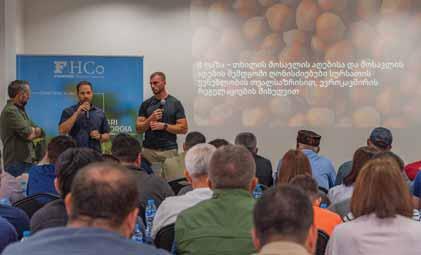
port or access to updated techniques,” said Agostinucci. “Many hazelnut orchards are small, with fragmented plots, which makes it difficult to scale up the production or introduce mechanization.”
Yet the demand for high-quality hazelnuts — especially in the European Union, where Ferrero sources nuts for its Nutella and Ferrero Rocher lines — has created a clear opportunity. Quality and food safety standards are tightening globally, and these trainings are essential to ensure Georgian hazelnuts meet those standards and remain competitive.
The FAO-led workshops were designed to introduce practical, hands-on knowledge tailored to local conditions. The curriculum was built around four core areas:
Sustainable Orchard Management: Best practices in pruning, fertilization, irrigation, and the use of certified planting material. Integrated Pest Management (IPM): Emphasizing reduced chemical use, biological controls, and safe pesticide application. Mechanisation and Orchard Floor Management: Demonstrating time- and labor-saving tools for weeding, mowing, and harvesting. Organic and Regenerative Farming: Strategies to build long-term soil health, increase biodiversity, and adapt to cli-
mate change.
The trainings emphasized modern orchard management techniques to help farmers boost productivity and reduce losses from diseases and pests such as the brown marmorated stink bug (BMSB). IPM methods and Good Agricultural Practices (GAP) were central to these sessions, offering guidance on sustainable pesticide use and effective disease control. Additionally, the sessions introduced regenerative agriculture approaches to improve soil resilience.
The questions asked at the trainings varied by region. In Samegrelo, farmers were mainly interested in planning the right measures to combat diseases. In Kakheti, the focus was on irrigation and fertigation issues, as well as hazelnut varieties and related tree pollination. However, in both regions, post-harvest measures, such as drying and cleaning hazelnuts from foreign bodies, remain an important issue.
WHAT FARMERS ARE SAYING
Otar Sherozia, a hazelnut grower from Senaki, said the training changed how he thinks about day-to-day farm management.
“I used to rely on traditional methods, passed down from my parents,” he said. “But after the training, I began checking the pH and the electrical conductivity of my irrigation water before applying fertilizers. I’ve already seen improve-
ments in my orchard’s overall health.”
Sherozia said his main challenge remains the speed of harvest, especially when competing with environmental conditions. “BMSB (Brown Marmorated Stink Bug) can cause real damage if we delay harvesting. And since we stop using pesticides by harvesting period, it’s a race against time,” he said. Meanwhile, Kakheti-based farmers were more concerned with irrigation infrastructure and the use of pollinator trees. In Samegrelo, the main focus was disease and pest control. In Kakheti, irrigation and pollination were hot topics. But one thing united both regions— everyone wanted better post-harvest handling solutions.
FOOD
One of the more technical but critical components of the training involved aflatoxin prevention—a food safety hazard caused by poor drying or storage. While invisible to the naked eye, aflatoxins can pose serious health risks and are strictly regulated in the EU.
“If hazelnuts aren’t timely and properly dried or are attacked by pests, they can become unfit for sale,” Agostinucci explained. “This is where small mistakes can result in big financial losses.”
Agostinucci emphasized that postharvest issues, such as cleaning, drying, and storage of Hazelnut, remain some of the most persistent challenges. “Farmers could really benefit from proper drying facilities or modern sorting machines,” he said. “Investment in rural infrastructure and stronger linkages between growers and processors would be useful.” He also stressed the need for yearround support, not just short-term projects. “Timely guidance is critical. Farmers need to know what to do not just during harvest, but before and after.”
Beyond boosting productivity, the ultimate goal of the initiative is to make Georgian hazelnuts a trusted product in high-end markets. Aligning with EU standards is both a necessity and an opportunity. “We want to see Georgian
hazelnuts sold as a premium product with traceable origins,” Agostinucci said. “That requires quality control, certification systems, and farmer education.” Sherozia agrees. “If we want to compete with Turkey or Italy, we need to keep improving. That means investing in better practices, and also in each other.”
This is only the beginning. In the coming months, FAO and AgriGeorgia will organize Hazelnut Machinery Demonstration Day, giving farmers a closer look at tools that can transform orchard management from weed control to mechanical harvesters. “This event will provide and opportunity for farmers to see new technologies in action and meet equipment suppliers,” said Agostinucci. “It’s part of building a complete support system.” The long-term goal is to connect Georgian farmers more directly with processors, exporters, and buyers, ensuring that the benefits of growth are shared fairly across the value chain.
Georgia’s hazelnut sector is now better positioned than ever to capitalize on its export potential, attract investment, and improve livelihoods across rural regions. Importantly, progress depends on embracing sustainability, technology, and continuous learning. “FAO, through the support of the EU and Sweden, aids farmers in receiving timely and accurate guidance,” said Agostinucci. “Ultimately, there is great potential in improving export readiness and quality, which in turn supports Georgia’s economic resilience and raises farmers' incomes.” With strategic support from FAO, AgriGeorgia, the European Union, and Sweden, farmers are gaining not just knowledge, but confidence. By blending traditional expertise with modern science, they’re building a more resilient, sustainable, and profitable industry. Hazelnuts are part of Georgia’s agricultural identity. But their future depends on continued learning, adapting, and investment in better practices. For thousands of smallholders across Georgia, the message is clear: the world is ready for Georgian hazelnuts, but only if Georgia is ready for the world.

BLOG BY TONY HANMER
It’s been a couple of weeks since I posted a reel (a film up to 90 seconds long) on Facebook, of my wife in the process of making cucumber kimchi, spicy pickles Korean style, which can be made with a number of different vegetables. We have long had Korean friends, some of who taught Lali the recipe, and it’s been a favorite of ours ever since. Well, something must have clicked, after years of my posting photos and videos on Facebook and slowly gather-
ing followers and friends. I haven’t bothered to migrate to or add another social media platform, finding my hands full with this one. Suddenly, the numbers of likes, responses, new friend requests and followers suddenly began to shoot up, into what’s called “viral.” That video is now approaching half a million likes, with another hard on its heels and more shooting up. We have added more clips, responded to questions and comments, and have started posting more such video episodes of “Lali’s Cooking Show,” mixing Georgian and foreign cuisine. People can’t get enough. My followers have gone from 6000 or so to past 11,000. Modest monetization

is in the works, and we have a new fan base. It’s quite exhilarating.
We do this both to promote the guest house and to promote happy living in faraway, challenging Svaneti. I’m paying attention to what gets the largest number of responses as fast as possible: it’s definitely Lali’s smiling face and positive demeanor. Yes, there is hard work in running the guest house, and we show that too: dishes and laundry and cleaning up after 20 or so guests have come through for a night and three meals. Videos featuring me, landscapes, cloud time-lapses or whatever get a few thousand likes, too. But Lali’s the star here. We’ll go with that.
It’s not come from studying how to get more people interested; more from stumbling across something which people like, and making more of the same, but not just to make more. The response has been overwhelmingly positive. We won’t get into “flame wars” with any naysayers: that trap must be avoided as a time-waster and joy-vampire, a no-win game.
Khachapuri… kubdari, the Svan meat pie… khashlama, beef stew… gardening… picking fragrant rose petals for tea, liqueur and jam… a tour through the cafe during meal time… introducing my wife in general. All, or mostly, in Georgian, as this is the mother tongue of most of my friends and followers now. It’s fun, as well as the work of thinking of and posting new content.
As the videographer, it’s up to me to check the lighting and spiel and warn her when the 90-second mark is approaching, because that’s all the time we get in

this medium. I’m shooting almost entirely in vertical orientation, recognizing that most people will be watching on their phones instead of horizontally-oriented tablet or laptop screens. So this is different for me, but that’s fine. Next, I must learn how to edit the videos more: up until now, they have been one shot each, and usually only one take too. Adding voice-overs, subtitles, stills and joined video snippets will make things more creative. Thankfully, there are plenty of free programs for doing all this on either phone or laptop; there’s just a small learning curve. It’s really an extension of photography and general video work. What for? Partly for fun; partly to show
people how we live up here, as too many Georgians have never set foot in Svaneti. There’s so much here to discover, and we hope to entice people to make the journey and find that it’s worth it, whether they stay with us or not. Come on up!
Tony Hanmer has lived in Georgia since 1999, in Svaneti since 2007, and been a weekly writer and photographer for GT since early 2011. He runs the “Svaneti Renaissance” Facebook group, now with over 2000 members, at www.facebook.com/groups/ SvanetiRenaissance/ He and his wife also run their own guest house in Etseri: www.facebook.com/hanmer.house.svaneti
In today’s Sakartvelo, the nationallevel narrative about the country’s geopolitical vector of development is plainly dichotomic – either Western or Northern. If we are lucky enough to manage to propel the country towards the West, the system of education will probably remain functioning in compliance with the already well-tested Bologna Process that upended the entire system of education in Georgia after the collapse of the Soviet Union, part of which we used to be. But if we are doomed to once again be embraced by the tentacles of the Russian empire and its way of life, then our system of education will probably behave according to the Russian rules and regulations of enlightenment.
Incidentally, starting from the new school year, by the upcoming 1st of September, paramount changes are expected to take place across the entire vast territory of Russia. Namely, federally unified educational demands in teaching various school subjects are going to be introduced in the monolithic Russian system of education. In fact, students across the entire country will be learning all their core and other subjects based on compulsory, stereotyped programs approved by the state. It is not known so far whether electives will be allowed at all. The allocation of hours needed for learning a subject will also be dictated by the state, in the person of the Ministry of Education. This kind of strictly limited system functioned in the former Soviet Union.
Some people reminisce that the Soviet system of education had its notable merits. Several generations would warmly, nostalgically, and gratefully note in Russia—and not only in the Russian Federation—that the Soviet system of education was perfectly fit for producing
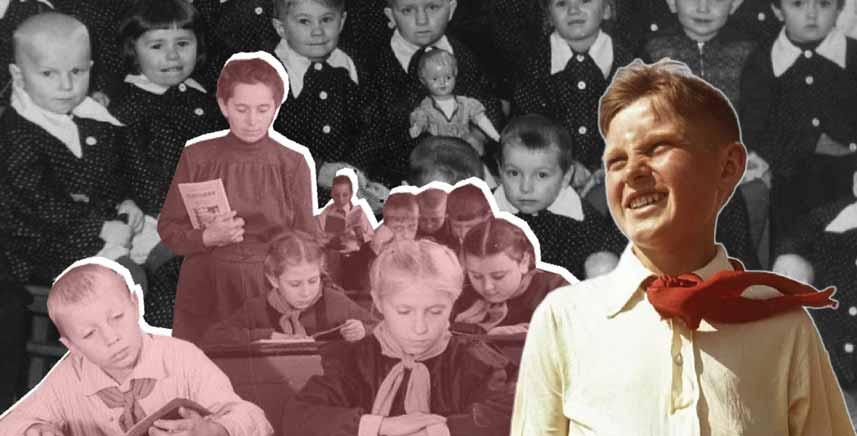
hundreds of outstanding scientists. Allegedly, once, President Kennedy of America said that the Soviet Union was not threatening the United States with just long-range rockets and missiles but, in the first place, with its system of education. These words reflected a concern prevalent in the US during the Cold War, specifically after the famous launching of Sputnik by the USSR. The concern emanated from the consideration that the Soviet Union's technological progress, particularly in space and missile technology, was empowered by a robust educational system concentrated on science and engineering. While long-range rockets were a direct military threat, the supposed advantage of the Soviet edu-
cation system was perceived as a longterm menace to American supremacy in various fields of life. Returning to the main theme of this article, my youth could easily serve as a life-sized example of the Soviet approach to educating the younger generation. Throughout the entire Soviet Union, education followed a single, unified methodology. While individual teachers across the Soviet republics employed their own styles and techniques, this did not imply any fundamental differences in the educational system itself. The variation was purely linguistic, occasionally reflected in minor national additions of poetry and literature. Nothing more. Examinations, diplomas, discipline—even
the architecture of school buildings— were all standardized.
At the same time, teaching was strict, evaluations were carefully considered, and subjects were taught with a strong emphasis on the scientific and technological advancements of the era.
Starting in the 1980s and 1990s, the system began to shift slightly: alternative teaching methods were introduced, and new textbooks began to emerge—changes that were not necessarily negative. However, the current trend toward re-unifying educational methods, curricula, and textbooks could potentially steer the Russian educational system back onto Soviet tracks. This might be a troubling signal, though not one that should con-
cern us Georgians directly. Still, it must be acknowledged that the educational rigor of those strange times was solid— and readily applicable to real-life demands. Currently, in every former Soviet republic, their individual, innovative system of education is functioning, and I doubt that any of them would opt to follow in the Russian footsteps. On the other hand, it is very curious why the Russians are bumping back to the old ways of enlightening their youth. Could this be rational in any possible respect, even if the Soviet system produced good enough specialists to compete with the West? They did—but the consequence is well known to the entire world, isn't it?
REVIEW BY IVAN NECHAEV
When Anita Rachvelishvili walks on stage, something ancestral enters the room. Her presence—dignified, unyielding, unapologetically vocal both musically and politically—reconfigures the atmosphere. On June 27, she took the stage of Factory Tbilisi for a major public concert alongside the Georgian Philharmonic Orchestra, conducted by Nikoloz Rachveli. For a singer who has made rare large-scale appearances in her home country in recent years, it was more than a musical event: it was a statement.
The venue, however—gleaming, ambitious, and profoundly ill-suited to classical performance—resisted her every note. A former industrial site reimagined as a cultural hub, Factory Tbilisi offered luxury visuals, polished production, and private seating. What it lacked was the one element that music cannot do without: resonance.
This was the central paradox of the evening. A singer whose voice has shaken the walls of the Met and La Scala, whose every phrase carries the weight of operatic history, now had to project herself through a PA system better suited to TED Talks or fashion week. The result: a concert of symbolic power and acoustic tragedy.
Though Rachvelishvili has performed in Tbilisi more recently—most notably in a more intimate setting last year—this concert marked a significant return to the public stage. It unfolded not within the state-supported institutions that long kept her at arm’s length, but in a new, privately developed venue. The subtext was clear to those who follow Georgian cultural politics: this was a performance on her terms.
The evening began with the Carmen Suite, a logical and emotional anchor given Rachvelishvili’s definitive performance history in the role. But from the first downbeat, things fell apart. The
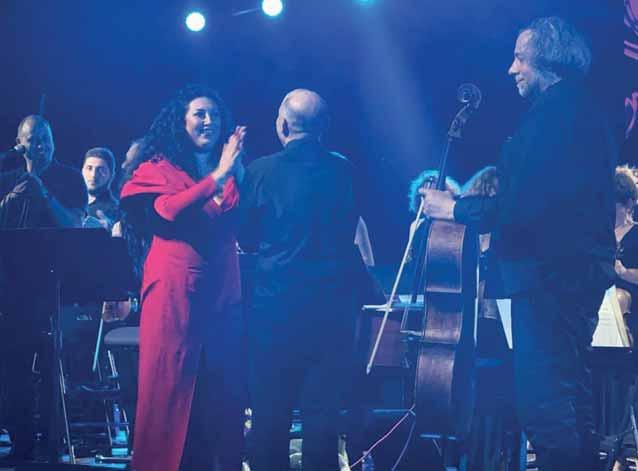
Georgian Philharmonic Orchestra, led with energy and intention by Rachveli, was sonically dismantled by the space. Low-end frequencies cracked, the subwoofer buzzed, and detail vanished into the hangar’s indifferent air. It was not music, but its broken projection.
What should have felt like homage instead resembled collapse. The factory swallowed the orchestra’s tone and returned it in a degraded form. Listeners were forced to imagine the performance through interference, as if recalling music heard once long ago.
It is no coincidence that this happened with Carmen, an opera of defiance, freedom, and doomed desire. What better metaphor for a voice striving to remain
sovereign inside a system designed for erasure?
Then came Anita. No distortion could erase the force of her presence. Her voice cut through the technological filter with brute physical will—although one could feel the strain of singing through the system, rather than into a hall. Her Dalida was incandescent. Her English-language jazz and blues pieces radiated expressive generosity, even as the amplification robbed them of intimacy. Her renditions of Georgian folk songs were electrifying not despite the context, but because of it: they brought history into an inhospitable present.
The program, by design, was eclectic:
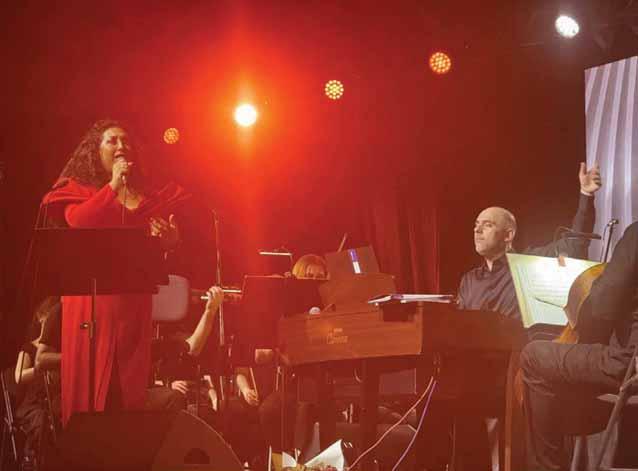
a cross-genre journey meant to lift spirits, reach across taste divides, and reassert joy in a time of fatigue. It achieved those goals. And yet, artistically, it felt stretched. The lack of narrative arc, the tonal zigzag between jazz, chanson, opera, and folk, made for a sequence of moments rather than a unified musical structure.
Still, each moment stood: earned, embodied, and delivered with the technical command and emotional immediacy that define Rachvelishvili’s art.
But again, the sound. The acoustics turned nuance into generalization. Everything was loud—the complex dynamics of her phrasing flattened into uniformity. This was not reinforcement; it was replacement. One heard her as if through an expensive screen: luminous, but distant.
The evening became a live illustration of Walter Benjamin’s warnings about art in the age of technical reproduction. In interviews before the concert, Rachvelishvili herself invoked The Work of Art in the Age of Mechanical Reproduction, pointing to the ways in which opera’s
aura—its ritual, its presence, its unrepeatable physicality—is being eroded by global broadcast culture.
She spoke about the decline of in-person opera attendance, the loss of shared experience, and the rise of institutions that no longer want stars because they are costly, unpredictable, politically vocal. This concert, ironically, confirmed her concerns: even at home, even live, even now, her art was forced to pass through a system that dulled its most precious qualities. She was live—but she was mediated. The aura had to fight for its life.
And yet, it did.
Factory Tbilisi, for all its branding, is not a concert hall. It is a symbol of a broader misalignment in Georgian cultural planning: the substitution of appearance for substance, of investment for infrastructure. Its ambitions are real— and commendable. But its current form treats music as content to be broadcast, not sound to be lived in.
In this sense, the concert was not just about Anita Rachvelishvili. It was about the need for acoustic space in Georgia— not metaphorically, but physically. A country that produces world-class musicians cannot sustain them without stages where their art can breathe.
Rachvelishvili has plans: an academy, a pedagogical ecosystem, a center of excellence modelled on Milan’s La Scala, where Georgian musicians and technicians can train together. It is an ambitious vision. But it also contains the lesson of the evening: music cannot survive without spaces that understand the body, the voice, the air.
If this concert proved anything, it is that presence matters. Anita Rachvelishvili did not need a pristine venue to make her voice heard. She sang through the noise. Through the speakers. Through the hangar. Through the years of absence and silence and official disregard.
But presence without resonance cannot endure forever.
The audience knew it. They stood. They wept. They cheered. But they also left knowing that this performance—like so many things in Georgia today—was a miracle made despite the system, not because of it.
Rachvelishvili’s voice will return. She will teach. She will build. But if this country is to retain its greatest cultural figures, it must offer them something more than symbolism. It must give them space. Literal space. Resonant space. Space worthy of the sound it claims to celebrate.
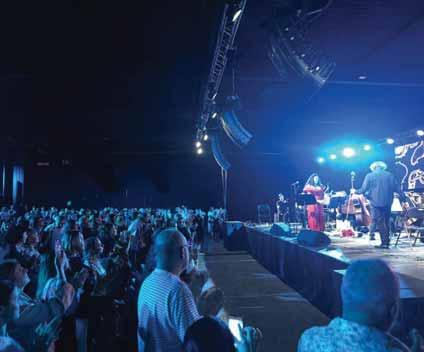
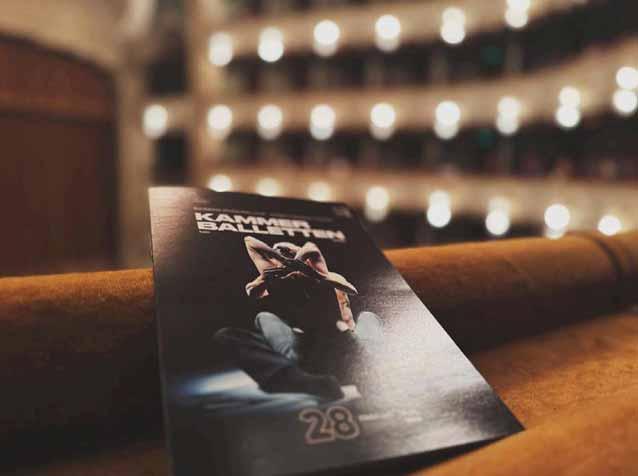
REVIEW BY IVAN NECHAEV
Kammerballetten’s appearance at the Tbilisi Ballet Festival felt like a tectonic shift. Curated by Danish ballet visionary Tobias Praetorius and framed by the unflinching eye of artistic director Nina Ananiashvili, this program of chamber-scale ballets drew together some of the most feverish choreographic minds of our time—Paul Lightfoot, Hans van Manen, Emma Portner, Sebastian Kloborg—and cast them like lightning bolts across a Georgian stage.
The effect was cinematic, personal, at times brutal. This was no gala, no parade of virtuosic pleasantries, but an anatomy of dance as psychological theater, love letter, hauntology. Over the course of
two acts, chamber music and minimalist staging laid bare the tremors beneath the flesh of contemporary ballet, as if the entire evening were unfolding in the interior space of the body—viscera before spectacle, pulse before poise.
THE NEW CLASSICAL IN DIALOGUE WITH THE NOW
The evening opened with SARCASMEN, a quintessential Hans van Manen exercise in distillation. To Prokofiev’s biting “Five Sarcasms,” the duo of Salome Leverashvili and Timothy van Poucke—both principal dancers of the Dutch National Ballet—offered a textbook lesson in spatial architecture. Van Manen's choreography, all dry wit and wry glances, probes the negative space between dancers as much as their limbs. Leverashvili’s command of angles and muscular wit played beautifully off van Poucke’s controlled lyricism. It was a cool beginning, a taut
overture to the emotional bloodletting that followed. That came in OTHER LITTLE STORIES, a poignant duet by Amilcar Moret Gonzalez, danced by Georgian star Nino Samadashvili and the increasingly arresting Giorgi Potskhishvili. Set to the postminimalist melancholy of Ezio Bosso, this was chamber ballet as whispered memory. Samadashvili moved like a breath suspended between confession and disappearance; her hands trembled with unspoken dialogue. Gonzalez’s choreography favors the unspooling of time—small, fractal gestures, dislocated unisons, emotional aftershocks. It was one of the evening’s rare moments of deep quiet.
Then, ONCE I HAD A LOVE arrived like a vinyl record slashed with a blade. Sebastian Kloborg, with Maria Kochetkova, summoned the ghost of Blondie into a duet of emotional entropy, crash-
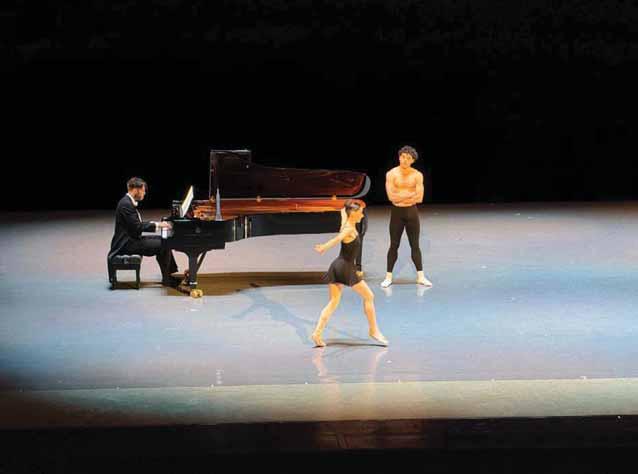

ing new wave nostalgia into the fractal structures of Philip Glass. Costumed in GANNI, the Danish fashion house, they seemed like icons resurrected from some arthouse apocalypse. Kochetkova danced like a pop goddess unraveling at the seams, and Kloborg—choreographer and co-performer—exuded the energy of a man dancing with the shards of a past life. Here, ballet was a medium for cultural dissonance, not harmony.
In ELEPHANT, Emma Portner, a choreographic oracle of movement-as-ritual, performed alongside Toon Lobach in an otherworldly fusion of contemporary dance, video-game geometry, and gothic decay. Portner's body is a grammar of collapse and recoil, and this duet, accompanied by live musicians and haunted by the music of Peteris Vasks and Mirel Wagner, was a dirge in motion. Here, ballet became sedimentary—layered, broken, regrown.
With NEUE BAHNEN, Praetorius offered a love letter to Brahms—and to the vanished idea of pure duet. Alban Lendorfand Emilie Palsgaard embodied a shared center of gravity, their phrasing rooted in the Romantic but destabilized by subtle asymmetries. The musical trio—Emma Baird, Alexander McKenzie, Toke Moldrup—performed with a chamber ensemble's attentiveness, allowing breath to drive both sound and step.
The act closed with THE GUST, Kloborg’s understated jewel—a duet with “a special guest” revealed to be none other than Nina Ananiashvili herself. Her appearance drew a collective intake of breath from the Georgian audience, a queen stepping out of the wings. But this was no cameo. Kloborg and Ananiashvili danced with a silence that said more than movement. Here was a meditation on legacy, time, and the dignity of presence. In an age obsessed with youth, Ananiashvili’s return felt like an act of aesthetic resistance.
CHAMBER BALLET AS EXISTENTIAL REFLECTION
The second act comprised a single, longform work: SELVPORTRAT by Paul
Lightfoot. This was the psychological climax of the evening—less a portrait than a psychic excavation. Featuring Maria Kochetkova, Toon Lobach, and Sebastian Pico Haynes, the piece explored grief, memory, and identity through a shifting interplay of trio forms. Alexander McKenzie’s score, performed live once again, wove an eerie intimacy into the space.
Lightfoot’s choreography is a cinema of angles and ruptures: sudden drops into the floor, bodies that cling and then repel like mismatched magnets. The lighting design—a bruised palette of sepia and pale neon—suggested an attic of memory. Each dancer felt like a version of the same self, refracted across timelines. Kochetkova moved with glassy anguish; Lobach offered control dissolving into doubt; Haynes, all volatile elegance, stitched the scenes together with uncanny force.
If classical ballet taught us to build mythologies, Lightfoot’s chamber ballet dismantles them. SELVPORTRAT is deeply human—wounded, uncertain, suffused with longing.
CURATION AS CHOREOGRAPHY
What makes the Kammerballetten appearance at the Tbilisi Ballet Festival so resonant is not only the quality of individual works, but the curatorial arc. Nina Ananiashvili has long understood that ballet’s future lies in the fertile soil between forms, between genres, between ages. By inviting Kammerballetten, she brought Georgia into the intimate, radical present of European dance. This was ballet without hierarchy. Dancers, musicians, choreographers, and designers functioned as a single kinetic organism. The program unfolded like a suite of letters from a future that still remembers its past.
In a city where dance is often framed by the monumental, Kammerballetten offered a miniature opera of emotional precision. It whispered what others shout. And in that whisper, we heard something rare: a ballet of truths, unvarnished, unguarded, and urgently now.
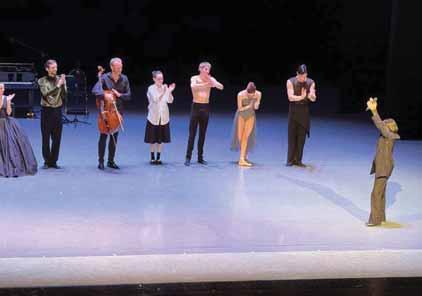
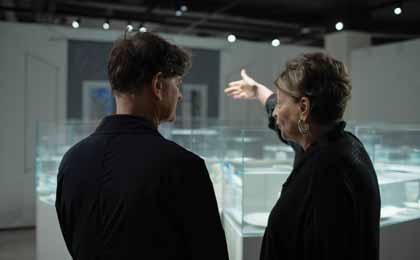
BY
The newly established AFA – Art Foundation Anagi officially opened its doors with an exclusive private viewing at its headquarters on 12 Zurab Avalishvili Street, Park Home Vake. The event heralded the arrival of a visionary cultural institution dedicated to preserving Georgia’s artistic heritage, while fostering innovative curatorial practices and fresh creative dialogues.
Founded by renowned cultural leaders Zaza Gogotishvili and Thea GoguadzeApfel, the foundation sets a precedent in the Georgian cultural landscape by merging tradition and experimentation across multiple thematic spaces.
“AFA – Art Foundation Anagi thoughtfully presents important moments from Georgian art history, creating meaningful connections between the past and the present,” noted Massimiliano D’Antuono, the Italian Ambassador to Georgia, reflecting the international appreciation the foundation has already garnered.
AFA’S VISION: A NEW HOME FOR GEORGIAN ART
Co-founder and Project Author Thea Goguadze-Apfel elaborated on the foundation’s deeper aspirations: “The idea behind AFA was to build more than just an exhibition space. We wanted to create a place where Georgian art—past and present—can be seen in a new light. It’s about connecting generations, open-
ing conversations.”
True to this vision, AFA launched an ambitious program that integrates historical context with contemporary exploration, positioning itself as a dynamic platform for dialogue within Georgia and beyond.
THEMATIC SPACES: A CURATED JOURNEY THROUGH
“The AFA – Art Foundation Anagi is structured around several distinct thematic spaces, each serving a specific function within the foundation’s broader curatorial framework,” explained Mariam Shergelashvili, one of the exhibition curators. She outlined the spaces:
AFA Curatorial Hall: Hosting the research-driven exhibition Fragments of Transition was a space that featured pivotal works from the late 1980s and early 1990s by Georgian artists Alexander Bandzeladze, Luka Lasareishvili, Mamuka Japharidze, Iliko Zautashvili, Gia Rigvava, Guela Tsuladze, Koka Ramishvili, alongside archival material on Gia Edzgveradze. The exhibition bridges historical narratives with contemporary interpretation, highlighting a transformative era in Georgian art.
AFA Gallery: Extending the exhibition concept Fragments of Transition, the presentation continues in the AFA Gallery space, fostering a dialogue between two prominent artists, Karlo Kacharava and Mamuka Tsetskhladze, curated by art historian Keti Tsetskhladze.
AFA | Sergo Kobuladze saw a meticulous reconstruction of the iconic artist’s studio; a space presenting original works,
drawings, and a rare archival film, immersing visitors in Kobuladze’s creative world.
AFA Archive: Curated by Konstantine Bolkvadze featured Gregor Danelian’s Cappricios, an exhibition exploring the painter’s distinctive artistic language.
AFA Object: This room housed Lia Bagrationi’s site-specific installation 13 Aquariums and a Fish, probing symbolic and philosophical themes through immersive materiality.
AFA Photo and AFA Movie: In partnership with Gallery Fotoatelier, this area displayed Sergei Parajanov on Set, a photographic series documenting behindthe-scenes moments from the film The Legend of Surami Fortress, accompanied by a screening of the film itself. The space also featured Giorgi Shengelia’s contemporary photography project Accidental Portraits.
Mappa Cartographica: Offering a rare collection of original historical maps and privately owned antique books, this space traced journeys through time and borders.
The exhibition Fragments of Transition stood as a cornerstone of the foundation’s mission. Many of the works displayed had been absent from Georgia for decades, residing primarily in private collections abroad.
“It’s been deeply meaningful to support the return of these works to Georgia after so many years,” said Françoise Friedrich, who facilitated their repatriation. “Many of them were created during a moment of transition when artists were responding to rapid shifts in society, politics, and identity. There’s a rawness and urgency in the work that still speaks powerfully today. Seeing them exhibited here, in a space designed with such care and historical awareness, is incredibly moving. It gives these works the attention and context they deserve. For me, this is not just about revisiting the past— it’s about recognizing the enduring relevance of these voices and the stories they carry. AFA has done something truly valuable by making this possible.”
Eka Enukidze, the project advisor, added critical historical context: “This is a truly unique exhibition. It all began in Cologne with an exhibition titled Dialogue, which featured not only Georgian artists but
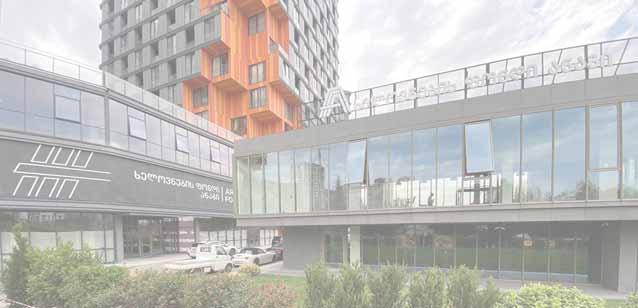
PUBLISHER & GM
George Sharashidze
COMMERCIAL
DEPARTMENT
Commercial Director: Iva Merabishvili
Marketing Manager: Natalia Chikvaidze
EDITORIAL DEPARTMENT:
Editor-In-Chief: Katie Ruth Davies
Journalists: Ana Dumbadze
Vazha Tavberidze
Tony Hanmer
Nugzar B. Ruhadze
Erekle Poladishvili
Ivan Nechaev
Mariam Razmadze
Layout: Misha Mchedlishvili
Photographer: Aleksei Serov
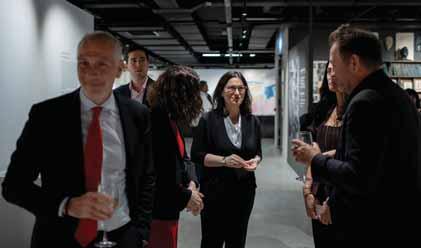
also their European counterparts. For many of the Georgian participants, it was the first time—following the collapse of the Soviet Union—that they had the opportunity to travel and exhibit in Europe. The Berlin Wall had just fallen, and this marked their first real contact with the Western art world. The exhibition was received with great enthusiasm and led to years of continued collaboration. A real dialogue was established between Georgian and Western European artists. Now, to see these works return to Georgia—many of which have been in private collections in France for decades—is incredibly meaningful. After 35 years, these pieces are back in Tbilisi, and for the artists themselves, it’s an emotional and powerful moment. When the foundation officially opens in September, we hope this will not only be a reflection of that historic exchange, but also a renewed opportunity to reopen that dialogue once again.”
The private viewing attracted considerable attention from international cultural figures and journalists. Jean-Jacques Le Gall, a French cultural magazine journalist, remarked, “This is my first visit to Georgia, and discovering AFA – Art Foundation Anagi was a real highlight. The foundation stands out for its modern approach—not only in terms of architecture and design, but in how the exhibitions are structured. Each space is immersive, thoughtfully curated, and offers a clear sense of purpose. It’s a place where the visitor is guided through a layered experience, both spatially and intellectually. AFA feels current, international, and deeply connected to its context.”
Beyond exhibitions, AFA’s foundational mission is to foster a sustainable and dynamic creative ecosystem in Georgia, one where tradition and experimenta-
tion coexist symbiotically. Through collaborations with Georgian artists, curators, collectors, and international partners, the foundation articulates new perspectives that ensure Georgia’s cultural voice resonates on the world stage.
Massimiliano D’Antuono underscored this role: “AFA – Art Foundation Anagi thoughtfully presents important moments from Georgian art history, creating meaningful connections between the past and the present.” This ongoing dialogue between history and innovation is reflected across the foundation’s spaces, each contributing to a multifaceted understanding of artistic identity and legacy.
The July 1 private viewing was just the beginning for AFA – Art Foundation Anagi. While the foundation officially opens in September, this event already signaled the arrival of a major new institution within Tbilisi’s cultural infrastructure.
With its rigorous research-based exhibitions, immersive installations, archival projects, and cross-disciplinary collaborations, AFA stands poised to redefine the role of an art foundation in Georgia—not only as a guardian of cultural legacy but as a generator of new artistic futures. Its layered approach, combining scholarship, curation, and contemporary practice, sets a high standard for how art institutions can engage meaningfully with both history and the present moment.
As Thea Goguadze-Apfel reflected, “This is just the beginning. We hope AFA will grow into a lasting part of the cultural scene in Tbilisi.” With the enthusiastic support of artists, historians, diplomats, and the international arts community, AFA – Art Foundation Anagi is well on its way to becoming a vibrant hub where Georgian art is celebrated, studied, and innovated for generations to come.
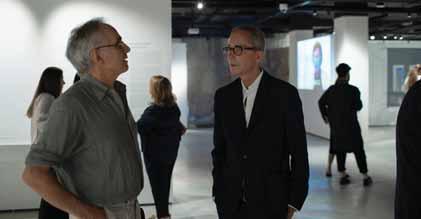
International Relations & Communications
Sofia Bochoidze E: sbochoidze@georgiatoday.ge
Website Editor: Katie Ruth Davies
Webmaster: Sergey Gevenov
Circulation Managers: David Kerdikashvili David Djandjgava
ADDRESS
22 Janashia Str. Tbilisi, 0179, Georgia
Tel.: +995 32 229 59 19 E: info@georgiatoday.ge F: GeorgiaToday
ADVERTISING & SUBSCRIPTION +995 577 72 52 61
E-mail: marketing@georgiatoday.ge
Reproducing material, photos and advertisements without prior editorial permission is strictly forbidden. The author is responsible for all material. Rights of authors are preserved. The newspaper is registered in Mtatsminda district court.
